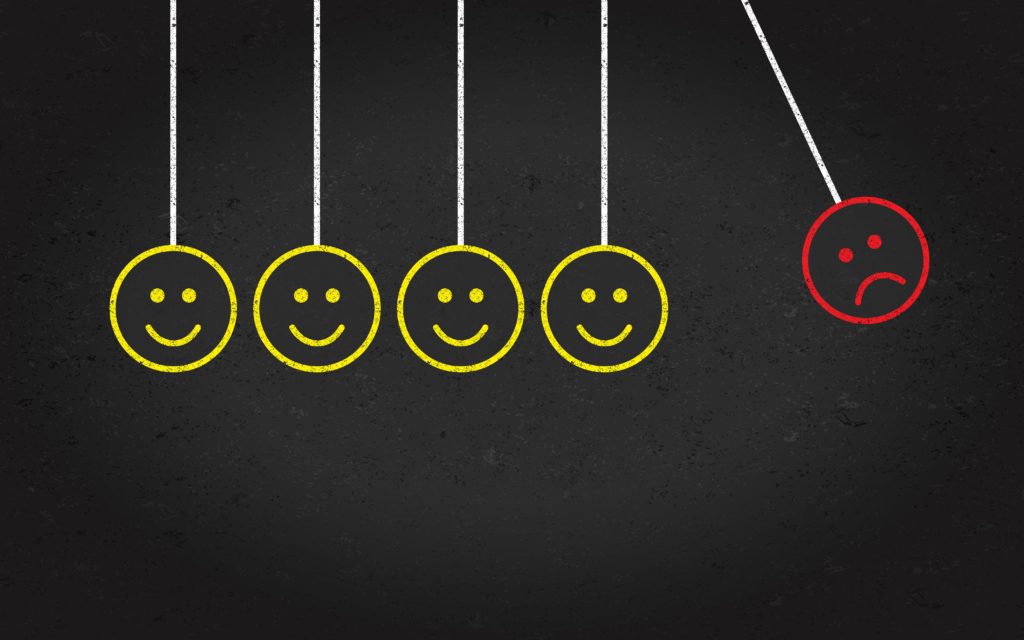
Not long ago, talking about the pros and cons of online therapy would be an absurd idea. Why would anyone even choose an online option over in-person therapy?
These days, online therapy has become much more common. There are some famous providers, like Talkspace and BetterHelp, along with many private therapists that offer their services directly online.
The shift towards online therapy isn’t incredibly surprising. Technology has dramatically changed the way we communicate and relate to our family, friends, and colleagues. It has become even more important since COVID-19, as ways to communicate over distance have become absolutely essential.
Indeed, technology helps to reduce social isolation and improves our mental health. It can help us to keep a positive mindset about the future.
The Benefits and Limits to Therapy

To begin the conversation on the pros and cons of online therapy, we need to talk about therapy itself. At one point, therapy was seen as a sign that something was seriously wrong with you. Similarly, mental health crises were seen as something to be ashamed of.
Those perspectives aren’t true these days.
In fact, according to a survey conducted on behalf of the American Psychological Association, “a total of 87% of American adults agreed that having a mental health disorder is nothing to be ashamed of, and 86% said they believe that people with mental health disorders can get better”.
Another survey by American Psychological Association Practice Directorate also found that “more Americans are seeking mental health treatment”, and “48 percent of those polled reported a visit to a mental health professional by someone in their household this year, and more than nine out of 10 (91 percent), said they would likely consult or recommend a mental health professional if they or a family member were experiencing a problem”.
These quotes highlight an important change in attitude towards mental health.
Mental health disorders simply aren’t seen in the same negative light these days. Many people even feel that therapy is helpful even for people not suffering from significant mental health problems.
However, even though “more Americans are seeking mental health treatment”, still almost half of Americans don’t seek professional help for mental disorders.
There are many reasons for this pattern, including barriers due to the mental health condition itself. For example:
- Some people struggle to admit that they need help or don’t believe that therapy will actually be useful.
- Even if they are willing to go, there are many processes to work through, like finding a good therapist, finding the money for the fees, and attending the appointment in person.
- It’s also important to maintain commitment to the process and attend regularly. This can be difficult, especially as it takes time to see results.
Such processes are difficult enough for people who are doing well. Someone experiencing a mental health crisis may find them all but impossible.
It’s not surprising, then, that so many people never get the help they need.
This study found that the main reasons for people not getting counseling help (in the U.S.) were
- Lack of confidence about the mental health system (37%)
- Lack of knowledge about the help that the person should seek (34%)
- Lack of affordability (25%)
- Concern about being stigmatized for looking for treatment (25%)
Online Therapy as an Alternative
Research shows there is a growing wave of online therapy; people who want to get therapy, are more likely to get it online.
Why people are choosing online therapy? Because it comes with some serious advantages, including comfort, accessibility, scheduling, and confidentiality (we will discuss these in more detail below).
Online therapy can also be used to complement face-to-face care. It can be used in between sessions with a face-to-face counselor, giving you immediate support. Websites and apps may also be a tool to facilitate discussion in between sessions or for a person to monitor their symptoms.
Online therapy is becoming so popular because having options for mental health treatment is actually really important. When our mind and soul are not 100% and we are facing difficulties, nobody needs to feel constrained by insurance, transportation, schedule, or lack of licensed therapists nearby.
Also, a study done by the University of California in Berkeley showed that those patients who used online therapy had broad improvements in their mental health and wellbeing.
The Pros and Cons of Online Therapy

The Positive Features
Perfect for People Who Have Physical Limitations
A few years ago, a homebound or disabled person would have found it difficult to access any type of care, let alone mental health care. The combination of physical and mental health problems can make the situation more difficult still, to the point that leaving the house may feel almost impossible.
Online therapy is perfect for seniors, their caregivers and anyone that falls in any of these situations. A mental health counseling session can take place from a favorite chair, the bed, or any place in the house.
It’s Very Convenient
Attending weekly counseling sessions in an office building isn’t realistic for everyone.
- If the client lives in a big city time spent in traffic and parking can make regular therapy appointments difficult.
- In the case of a remote area, difficulties with transportation, traveling, and the availability of counselors can greatly reduce the options.
- Seniors who can’t drive safely must also rely on transport, which may not be available at the right time.
In online therapy, clients can work with counselors that are far from their vicinity; allowing them to find a counselor who is the best fit for their situation.
Online therapy can happen anywhere, anytime, as long as there is a device with a good internet connection.
Discretion
Some people prefer to keep their mental struggles to themselves and can feel too vulnerable or ashamed if others know about it. Or it may be a person is very private and doesn’t want anyone else involved in their business.
Regardless of the reason, physically visiting a counselor in a medical building implies the person is there seeking mental health advice, making discretion much more difficult.
With online therapy, on the other hand, the company just needs your billing information. The process can be much more discreet than any in-person therapy.
Anonymity
Online therapy often provides the option of staying anonymous and using a nickname if preferred. You aren’t forced to provide personal details if you don’t want to and can still access the mental health therapy you need.
This option can be a decisive factor for seeking professional help, instead of facing problems alone. It could be particularly relevant if you need to talk about topics that concern you or that you don’t want others to know about.
Online therapy also gives you the option to not show your face to the counselor. You can choose not to use the camera or rely solely on tools like email or live messaging.
You Avoid the Social Stigma
We have talked about how social stigma can be a reason to avoid therapy.
The privacy and anonymity of online therapy helps you to avoid this issue entirely. The patient doesn’t even need to tell their family members anything at all.
Easier to Attend for People with Serious Mental Disorders
People that seek mental care with already diagnosed disorders like PTSD, depression, or anxiety, have the additional handicap that some days it is a real struggle just to leave the bed and get dressed.
If this basic step is difficult, imagine driving, parking, and waiting in a room to talk face to face with somebody. The difficulties may be a deal breaker to receiving treatment. Attending a therapy session without being forced to fake you are well enough to leave the house, is a positive relief for those suffering from these disorders.
That said, be sure to check whether the service you’re using is appropriate for your mental health condition. This is particularly true for large services, which are generally best for mild mental health issues, rather than severe ones
Provides Comfort and Saves Time

An online therapy consultation offers the advantage of you choosing when, how, and where it happens. The comfort and familiarity of a comfy chair in a corner, may inspire you to talk more openly and deeper about what is going on with you.
It adds spontaneity to the treatment. You are just a “click” away, broadly speaking, of taking advantage of the moment when you feel you are in tune to speak up your mind and soul.
In most cases, the therapist doesn’t have particular times to engage with you, although you may have the option of creating a schedule that suits you and the therapist.
This is much better than attempting to adjust your schedule to match the inflexible appointment slots at an in-person clinic.
Plus, there is no travel time to worry about and no time spent sitting in an office and waiting.
There are Various Communication Methods
Regular therapy relies on face-to-face conversations, while online therapy provides you with more options. Video chats are a common approach, allowing you and the therapist to see and engage with each other. However, email, text messaging, and live chat may also be available.
Live chat can be particularly powerful if you’re looking for on the go support, rather than long sessions.
Research shows that just writing down your problems, thoughts, hurts, and feelings, can already help to relax the mind, see the issues from a bit of distance, and find renewed strength (this is one reason why journaling is so powerful). When the writing exchange is, in addition, guided by a counselor, it may become therapeutic writing. In the long term, another advantage is to have a record of the therapy process.
The Problems with Online Therapy

Although the benefits of online therapy are many, it’s not always the perfect solution. There are some issues as well, which can sometimes make the therapy a poor choice.
Not for Everyone
Digital mental health services work better for some people than others. For example, anyone who loves one-on-one communication and relies heavily on body language may find a digital solution difficult.
Video chats help with this somewhat, but the connection is still different than if you were meeting them face-to-face.
With text-based therapy, there’s no ability to see expression at all. This can easily lead to misunderstandings or confusion.
Motivation may be an issue too. You might feel much less guilty about skipping an appointment with an online therapist skipping an in-person meeting.
It Relies on Technology
If a client doesn’t feel confident in their ability to use computers or other devices, using an online service may increase their anxiety and self-doubt instead of making them feel more comfortable.
Reliable internet and devices are also a must. If the technology interrupts the session, it can increase negative perceptions on the ability of receiving effective treatment. It’s crucial to ensure that the necessary tech resources are working well before trying online counseling.
Less Intimacy
Although a bond can be created with an online therapist as much as with an in-person counselor, the fact is that there is less intimacy. When we talk face to face to somebody in the same room, there are subtle ways that transmit meaning along with dialogue, that help to create the feeling of intimacy. Some people need that eye contact and the warmth of a presence to feel confident to open up and begin a therapy journey.
A client can also associate face-to-face therapy with self care; enjoying the time spent, the coffee, the ride back home lost in thoughts as “me time”. If a client is accustomed to face-to-face treatment for that reason, online therapy might not be as beneficial.
May Be Less Effective for Serious Illnesses
When facing a serious mental illness, the subtleties of communication are truly relevant. As stated above, online therapy can miss these cues and create misunderstandings. In-person therapy may be required in those cases, so the counselor can fully appreciate and understand what the client needs.
Another matter that makes digital mental health services less suitable for people with serious mental health problems, is in the case of experiencing a critical situation or crisis. In any situation where a fast, effective, and direct intervention is necessary, there may be a lack of immediate response since the therapist’s physical location might be far away from the client.
The Quality Can Vary
While many people have had fantastic experiences with online therapists, plenty of others have experienced issue upon issue instead.
For example, reviews for the service Talkspace revealed many people who felt that their therapist gave short and largely useless replies or didn’t seem to be paying much attention.
Indeed, many of the therapists for large online companies are independent contractors working from home. There’s always the risk that some of these therapists don’t take their role as seriously as they would for in-person therapy.
Not Always Covered by Insurance
Some insurance companies do not cover online counseling. Therefore, receiving long term therapy and paying for it out of pocket can easily be out of reach for some clients.
Online therapy is less expensive than in-person therapy, but it’s not cheap either. The costs can quickly add up if you need to pay them all yourself.
Even if some health insurance companies cover traditional therapy, they may not cover online therapy. Several factors influence this including state of residence, insurer, and insurance product.
Online therapy usually conflicts with Social Security too. If a client depends on receiving counseling services through a referral from their family doctor, most probably won’t be an online provider, but rather a public service therapist.
Data Can Be Compromised
There is always a concern about a breach of private information and this can certainly happen with face-to-face providers as well. However, it is more relevant to online therapy, as it may be easier for the data to be stolen.
But…Does Online Therapy Work? Here’s What Science Says

Of course, there’s a bigger question than the pros and cons of online therapy. Pros like convenience, discretion, and flexibility are only useful if the therapy approach actually works. So, does it?
According to science, online therapy can be. In a study on the efficacy of online therapy, the approach has proven to be clinically effective. Plus patients tend to feel more comfortable talking to their devices about things that they wouldn’t in a face-to-face session.
“Digital therapy can be just as effective as in-person treatment”, stated a study from the University of Alberta. According to Chelsea Jones, the study’s lead author, the COVID-19 pandemic raised a lot of necessary questions about the importance of mental health supports – especially with the shift to online therapy options.
Research is consistently showing that online treatment can be very effective for many mental health issues. Here are the results of a few studies:
- A 2014 study published in the Journal of Affective Disorders found that online treatment was just as effective as face-to-face treatment for depression.
- A 2018 study published in the Journal of Psychological Disorders found that online cognitive behavioral therapy is, “effective, acceptable and practical health care.” The study found the online cognitive behavioral therapy was equally as effective as face-to-face treatment for major depression, panic disorder, social anxiety disorder, and generalized anxiety.
An online therapist can be just as rigorous as a face-to-face therapy professional. They are registered professionals, their credentials have the same value, they need the same requirements to practice and have the same responsibilities. Online therapists just have chosen to introduce technology as a way to deliver their practice.
Why Does Online Therapy Cost Less?
It is matter of costs and return on investment. An online therapist can deliver their session from home, saving in costs, as much as a patient that uses their services. The approach is highly accessible to both the therapist and the client.
A therapist in an office has several costs linked to the physical space, as well as the limitation on the numbers of face-to-face patients he can see per day. An in-person therapist also spends time traveling and parking, plus they have their transportation costs to deal with.
Online therapists may even be able to work with multiple patients at the same time if they’re primarily doing so through texts and emails that don’t require real-time responses. This approach also provides the therapist with more time to think and re-read past conversations before responding.
What Do You Need to Know Before Choosing an Online Counselor?
Degrees are not the only consideration while choosing a therapist.
- Research: Go online and research the therapists. Look for the top ones near you or the top ones in the specialization you are looking for. Read the reviews. Check his qualifications and expertise. Pay attention to the features, terms, and conditions of the company you’re going through. These may be different depending on whether you’re looking at an independent therapist who works online or a large company like Talkspace.
- Ask for an interview with the therapist before starting any counseling. Ask as many questions as can. It’s the perfect occasion to look for some type of connection too. Ask if she has experience and worked previously with cases like yours.
- Ask for all the costs included: video session, phone sessions, email, text, time of the consultation, forms of payment, etc.
- Types of treatment used. Are any types of self-help processes included? What modalities do they work with and do these suit your needs? For example, some therapists rely on CBT techniques, while others use talk therapy approaches instead.
- The therapist communication skills: How he welcomes you, if he is totally focused on you. Does he look to you directly? Do you feel in your body that it is the right person for you? His tone of voice is also very important.
- Their availability. Can you reach them in case of an emergency or just out of hours? Do they have a plan in place in case you need their assistance personally?
Online Therapy Sites
There are several platforms offering online therapy services. Below are some of the most respected sites that have great reviews:
- BetterHelp. With an average rating of 9.6, BetterHelp is often considered the best online therapy service. They host more than 5,000 therapists and offer their services over the phone, messaging, and video chat to both PC and mobile users.
- ReGain Counseling. It is rated 9.1. They specialize in relationship counseling and offer services over the phone, chat, video, and online forums.
- Teen Counseling. Rated 8.9, this company specializes in youth counseling. They offer services via text, phone, chat, and video.
- Talkspace. Rated 8.5, is another top-rated therapy service. They offer more than 3,000 therapists and are available over text, video, and audio.
Free Online Therapy Sites
Free therapy sites are great not only for not costing money, but also to try if this type of therapy is right for you. You may start this service and realize that face-to-face therapy is the right choice for you, without spending any money.
Be cautious though, as the quality of support and advice on a free site might not be as good as on a paid one. As such, some of the pros and cons of online therapy from above don’t apply to these sites. This is particularly true for peer-based services.
- eTherapyPro. It is the best overall resource in the United States for online therapy chat. It’s convenient, accessible, and secure.
- 7 Cups. Best for Peer Support. 7 Cups is a therapy network for peer support based on volunteer listeners. It provides online therapy chat all over the world. Users can create connections via community forums or private chat with other members of the network.
- Free Online Therapy – Best for a Free Assessment. The services offered by Free Online Therapy are in partnership with other mental health support sites. Patients can browse the platform to find the online therapy chat services that suit their needs, and also choose the type of support system they want: volunteer, online therapy, or relationship counseling.
- TalkwithStranger – Great for anonymity. It provides free chat rooms where individuals can remain anonymous, and at the same time creating connections with other users on the site from all over the world. It’s 100% free, and better yet, it doesn’t require an account.
You can find out more about free online therapy services here.

Leave a Reply